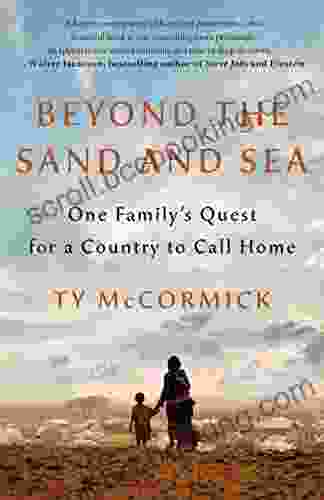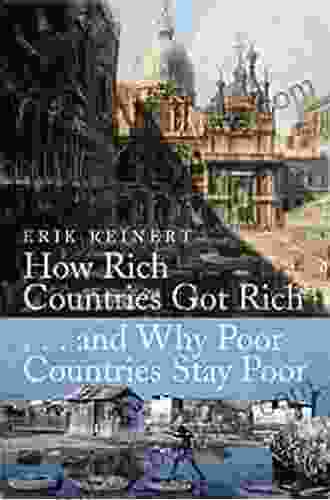Unveiling the Secrets: How Rich Countries Ascended and Why Poor Nations Remain Trapped

In the tapestry of global economics, a stark contrast unfolds between nations that thrive in abundance and those that struggle in poverty. The book "How Rich Countries Got Rich And Why Poor Countries Stay Poor" sets out to unravel this enigma, offering an insightful journey into the divergent paths that have shaped our world.
Written by renowned economist Erik Reinert, this thought-provoking work presents a compelling tapestry of history, economics, and policy, challenging conventional wisdom and offering a transformative perspective on the challenges of global economic development.
4.6 out of 5
| Language | : | English |
| File size | : | 16968 KB |
| Text-to-Speech | : | Enabled |
| Screen Reader | : | Supported |
| Enhanced typesetting | : | Enabled |
| Word Wise | : | Enabled |
| Print length | : | 387 pages |
The Seeds of Prosperity: How Rich Nations Forged Their Fortunes
Reinert traces the genesis of wealth in rich countries to a combination of factors: access to natural resources, technological innovation, and institutions that fostered economic growth. These societies embraced trade, harnessed scientific discoveries, and developed legal frameworks that protected property rights and encouraged investment.
Through vivid examples, the book illustrates how countries like Britain, the United States, and Japan leveraged these advantages to become economic powerhouses. Reinert highlights the role of colonialism and imperialism in shaping the global economic landscape, but also emphasizes that these factors were not deterministic.
The Obstacles to Development: Unraveling the Traps of Poverty
In contrast, poor countries often face a formidable array of obstacles that hinder their path to prosperity. These include: a lack of access to resources, weak institutions, and economic policies that stifle innovation and growth.
Reinert argues that these traps are not inherent to these societies but rather are the result of historical circumstances and misguided policies. He critiques the neoclassical economic orthodoxy that has dominated international development for decades, arguing that it has often failed to address the structural barriers facing poor countries.
Policy Prescriptions for a More Just Global Economy
The book concludes with a set of practical policy prescriptions designed to break the cycle of poverty and promote sustainable economic development in poor countries.
- Invest in education and human capital to develop the knowledge and skills needed for economic growth.
- Foster industrialization and technological innovation to create jobs and increase productivity.
- Establish strong institutions that protect property rights, ensure accountability, and promote rule of law.
- Reform international trade policies to create a more level playing field for developing countries.
- Address the debt burden and provide financial assistance where necessary.
Reinert emphasizes that these policies require a long-term commitment and a willingness to challenge the status quo. He believes that a more just and equitable global economy is possible but only through a fundamental shift in our understanding of development and the policies we pursue.
"How Rich Countries Got Rich And Why Poor Countries Stay Poor" is a groundbreaking work that challenges conventional wisdom and offers a transformative perspective on the challenges of global economic development.
Through a comprehensive analysis of history, economics, and policy, Erik Reinert illuminates the complex forces that have shaped the divergent paths of rich and poor nations. His insightful analysis provides a roadmap for understanding the obstacles to prosperity and the policies that can lead to a more just and equitable global economy.
This book is an essential read for anyone interested in understanding the complexities of global development, the challenges facing poor countries, and the solutions that can break the cycle of poverty and create a more sustainable future for all.
4.6 out of 5
| Language | : | English |
| File size | : | 16968 KB |
| Text-to-Speech | : | Enabled |
| Screen Reader | : | Supported |
| Enhanced typesetting | : | Enabled |
| Word Wise | : | Enabled |
| Print length | : | 387 pages |
Do you want to contribute by writing guest posts on this blog?
Please contact us and send us a resume of previous articles that you have written.
 Book
Book Novel
Novel Page
Page Chapter
Chapter Text
Text Story
Story Genre
Genre Reader
Reader Library
Library Paperback
Paperback E-book
E-book Magazine
Magazine Newspaper
Newspaper Paragraph
Paragraph Sentence
Sentence Bookmark
Bookmark Shelf
Shelf Glossary
Glossary Bibliography
Bibliography Foreword
Foreword Preface
Preface Synopsis
Synopsis Annotation
Annotation Footnote
Footnote Manuscript
Manuscript Scroll
Scroll Codex
Codex Tome
Tome Bestseller
Bestseller Classics
Classics Library card
Library card Narrative
Narrative Biography
Biography Autobiography
Autobiography Memoir
Memoir Reference
Reference Encyclopedia
Encyclopedia Grant Snider
Grant Snider Paul J Kosmin
Paul J Kosmin Jules Verne
Jules Verne Pa Traders
Pa Traders Thomas Hollowell
Thomas Hollowell Micah Toll
Micah Toll Robert S Witte
Robert S Witte Eric O Neill
Eric O Neill Eric San Juan
Eric San Juan Erin Moulton
Erin Moulton Eric Michael
Eric Michael Susan Braudy
Susan Braudy Joe Holt
Joe Holt Lisa Campell
Lisa Campell Matthew Desmond
Matthew Desmond Eric Helleiner
Eric Helleiner Melissa D Burrage
Melissa D Burrage Stewart Pearce
Stewart Pearce Erving Goffman
Erving Goffman Eric Dominy
Eric Dominy
Light bulbAdvertise smarter! Our strategic ad space ensures maximum exposure. Reserve your spot today!

 Felipe BlairDiscover the Ultimate Guide to Custom Revolvers: "The Custom Revolver: Eric...
Felipe BlairDiscover the Ultimate Guide to Custom Revolvers: "The Custom Revolver: Eric...
 Richard WrightInside the Decade That Transformed Wall Street: A Journey Through the Roaring...
Richard WrightInside the Decade That Transformed Wall Street: A Journey Through the Roaring...
 Oscar BellOne Family's Quest for a Country to Call Home: A Tale of Resilience, Triumph,...
Oscar BellOne Family's Quest for a Country to Call Home: A Tale of Resilience, Triumph,... David MitchellFollow ·10.5k
David MitchellFollow ·10.5k Raymond ParkerFollow ·14.5k
Raymond ParkerFollow ·14.5k Zadie SmithFollow ·3.6k
Zadie SmithFollow ·3.6k Dwight BellFollow ·16.9k
Dwight BellFollow ·16.9k Gordon CoxFollow ·7k
Gordon CoxFollow ·7k Richard SimmonsFollow ·6.8k
Richard SimmonsFollow ·6.8k Brody PowellFollow ·6.9k
Brody PowellFollow ·6.9k Vince HayesFollow ·17.5k
Vince HayesFollow ·17.5k

 Roland Hayes
Roland HayesMagda: A Mother's Love, A Daughter's Redemption - A...
Immerse Yourself in the Captivating True Story...

 Spencer Powell
Spencer PowellSnow White Retold: A Tale of Love, Magic, and...
Once upon a time, in...

 Jake Powell
Jake PowellMaster the SATs with Effective Strategies from 99th...
The SATs are a challenging exam,...

 Brian Bell
Brian BellSEO for Dummies: Unlock the Secrets to Search Engine...
In today's digital...

 Jaylen Mitchell
Jaylen MitchellBechtel: Unveiling the Unsung Heroes Who Built the World
In the annals of global infrastructure, the...
4.6 out of 5
| Language | : | English |
| File size | : | 16968 KB |
| Text-to-Speech | : | Enabled |
| Screen Reader | : | Supported |
| Enhanced typesetting | : | Enabled |
| Word Wise | : | Enabled |
| Print length | : | 387 pages |








